#japanese isn't nearly as gender neutral as some people make it out to be
Explore tagged Tumblr posts
Text
on the scale of 'monolingual english speakers assuming gender in all languages works the same way it does in english' this is so low in the importance scale that it doesn't matter
but sometimes i see people making posts on tumblr about japanese speaking characters using they/them or it/its, and like those words barely exist in that language, and any words you could use would just be weirdly convoluted and odd when its so easy and normal to not use any pronouns at all
like i know it's a joke but it is fun to imagine those conversations happening in japanese and being utterly baffled as to how it would actually work
#i mean sometimes people use pronouns specifically to be weirdly convoluted and odd in which case by all means go ahead#but it isn't the vibe in most cases#in japanese the words for 'they' are either he[plural] she[plural] or like 'everyone' or 'people' or '[name]&others'#and there isn't really 'it'? so much as 'that[implied not a person]' at best#but also i cannot emphasize how little the words 'she' and 'he' are used in everyday japanese speech#japanese isn't nearly as gender neutral as some people make it out to be#but other than gendered titles like 'girl' or 'son' etc most gendering in japanese happens by the speaker regarding themself#so there is a bit more freedom in being able to dictate for yourself how masculine/feminine you are grammatically#(at least in theory. there are of course societal conventions and stuff but i'm not here to talk about that now)#my posts
6 notes
·
View notes
Text
Japanese Linguistic Observations in Spy x Family - part 3
Part 3 - Yor's keigo
I discussed in part 1 about the different levels of speech in Japanese, particularly how Twilight changes his speech depending on the persona he's donning. He uses keigo, the standard polite form of speech, when he's acting as Loid Forger, but uses casual speech as Twilight. Yor, however, uses keigo all the time, to a degree that some would feel is excessive, but also makes sense for her character.

Keigo is the most basic form of polite speech in Japanese. It's the speech that's taught in pretty much every beginner Japanese learning course because it's the "safest" for most situations. Without getting too technical, it basically involves using the polite conjugations of verbs. All verbs in Japanese have a "polite" conjugation form that's used in keigo. For example, the verb "to go," 行く (iku), will change to 行きます (ikimasu): change the く(ku) to き (ki) and add -ます (-masu). -masu itself is then conjugated further to show past tense, negative tense, etc. Likewise, one would use です (desu) as the "to be" verb instead of its casual equivalent だ (da). For example, saying 車です (kuruma desu), which means "there is a car" instead of 車だ (kuruma da). It's even more casual to leave out the "to be" verb altogether.
Unlike Twilight, who changes his speech depending on who he's talking to or which facade he's using, Yor consistently uses keigo, whether she's talking to an adult like Loid, a child like Anya, and even an animal like Bond. She uses keigo with strangers as well, even those who are antagonistic to her, like the other assassins in the cruise arc.
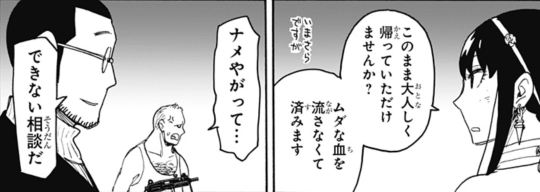
Even at times when using polite speech isn't warranted, like in her own thoughts, she still uses keigo regardless.
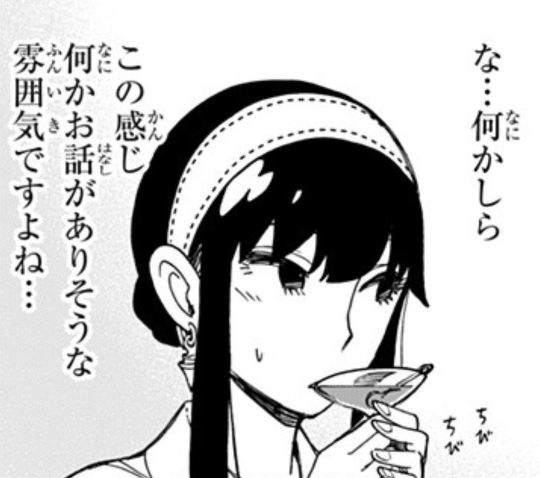
In addition to using keigo with pretty much everyone, she also uses the polite -さん (-san) honorific with everyone's names as well. It's not unusual to do this with fellow adults like Loid, Camilla, and Franky, but when it comes to kids, especially when they're not your own kids, other honorifics are also an option. For example, adults can use the honorifics -ちゃん (-chan) for little girls and -くん (-kun) for little boys, both of which denote endearment to someone young/cute. Loid calls Damian "Damian-kun" and Fiona calls Anya "Anya-chan" for example. But Yor uses "-san" for Anya, Damian, Becky, and probably every other kid she hasn't met yet! She uses "-san" with animals as well, which isn't nearly as common. She's the only one who calls Bond "Bond-san" and she even called the cat Kopi from chapter 43, "Kopi-san."
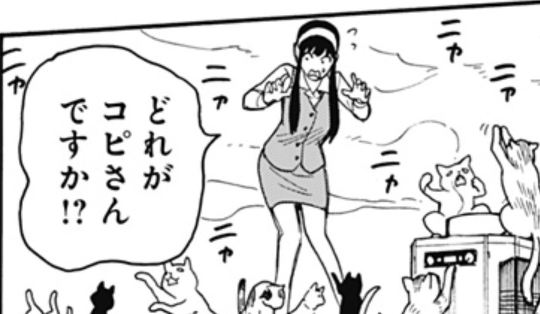
She also uses "-san" for people whose names she doesn't know, and in some cases, probably shouldn't show respect to. She calls the terrorists from the doggy crisis arc "terrorist-san", bad guys that she takes out on her missions "warumono-san," Olka's group "mafia-san," and the other assassins from the cruise arc "koroshiya-san."
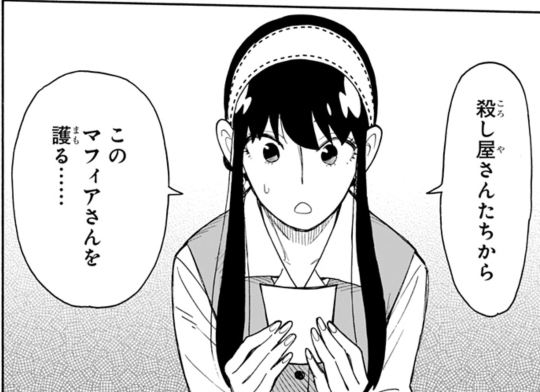
The only exception to Yor's excessive use of keigo is Yuri, which makes sense since it's standard practice to be more casual with a younger relative than an older relative or someone outside the family. He's the only person she refers to without "-san" (she just calls him "Yuri"). And while she does use the informal verb forms with him, she still uses "desu" and its conjugations. So overall, she's more casual with him, but not completely so.
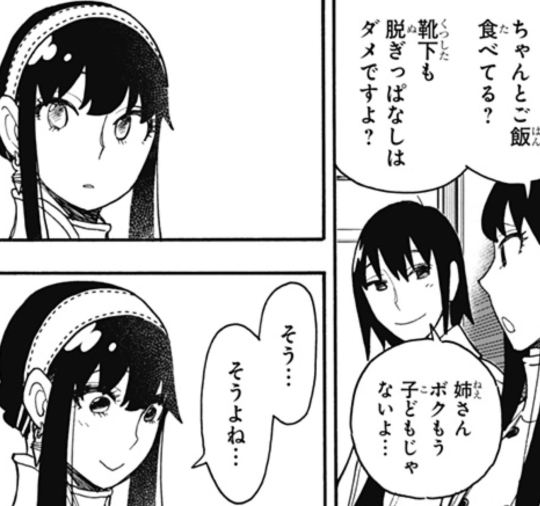
When talking about herself, Yor uses the standard, gender-neutral, polite word for "I"/"me," 私 (watashi). However, when talking to others, she never uses any form of "you." Like I mentioned in part 1 about how there's different ways of saying "I" and "me" in Japanese depending on the speech level, the same is true for "you." But it's always more polite to say someone's name or title instead of "you," and Yor does that all the time. Just like in part 2 how I couldn't recall any instance where Anya says "I" or "me" since she always refers to herself in third person, I can't recall any time Yor called someone "you" instead of saying their name or title.
While Loid uses the casual "you" word お前 (omae) when talking to Anya, Bond, Franky, and anyone else he doesn't have to be polite with, he doesn't use any form of "you" for Yor. He speaks to her the same way she does to him – saying her name plus "-san" instead of using "you."
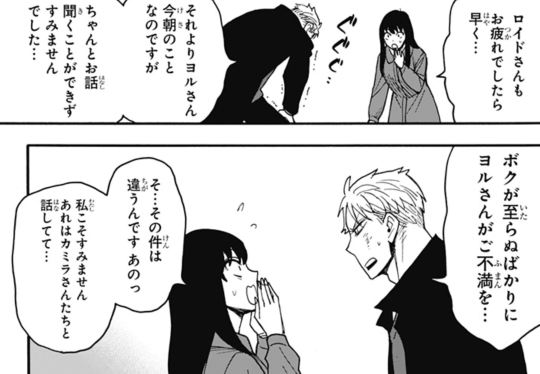
Unlike English, Japanese is a language where you don't have to say pronouns if it's understood by the context, which is why something like this is difficult to convey in a translation.
I think it's an interesting contrast that Twilight is constantly changing how he speaks depending on whether he's acting as Loid Forger, as a spy, whether he's conversing with a fellow spy like Fiona, a casual friend like Franky, someone he respects but can't be fully open with like Yor, and even how he talks to himself in his head…yet Yor is the total opposite. As I've discussed in this post, she's extremely consistent in her speech, never straying from being polite no matter who she's speaking to or whether she's in her Thorn Princess role or not, or even whether she's speaking to herself in her head or not. This just further proves that, while Yor has to keep her assassin job a secret, she doesn't have to create a fake persona for it. Unlike Twilight, who acts one way as a spy and another way as Loid Forger, and perhaps another as his "true" self, Yor doesn't feel the need to hide anything about herself other than her job as an assassin – Thorn Princess and Yor Forger are the same person who shows respect for others no matter what her relationship is with them.
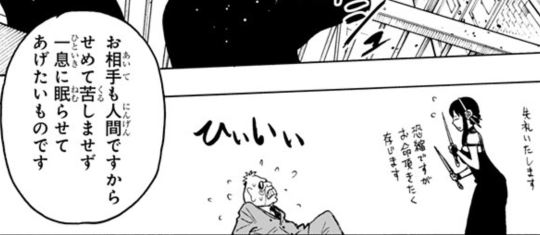
Such excessive use of keigo is odd for a fluent speaker, but it's not unheard of. There are plenty of examples of characters from other anime/manga who use keigo all the time too. I think it gives us an interesting, subtle look into their character. In Yor's case, I think her constant use of keigo comes from a combination of her sweet personality that never wants to offend anyone, but also her poor self-esteem. After all, keigo and other polite forms of Japanese speech are meant to elevate the listener while humbling the speaker. Yor speaks politely to everyone because she simply wants to be kind to everyone and make them feel comfortable, even those she has to kill, but at the same time, she often feels inferior to others.

However, there are rare exceptions where Yor stops using keigo which are, appropriately, during very suspenseful, high-stakes moments where politeness would be the least of her worries. For example, during her fight with Barnaby when she realizes she's holding back, she starts using casual speech. But she goes back to keigo before too long.
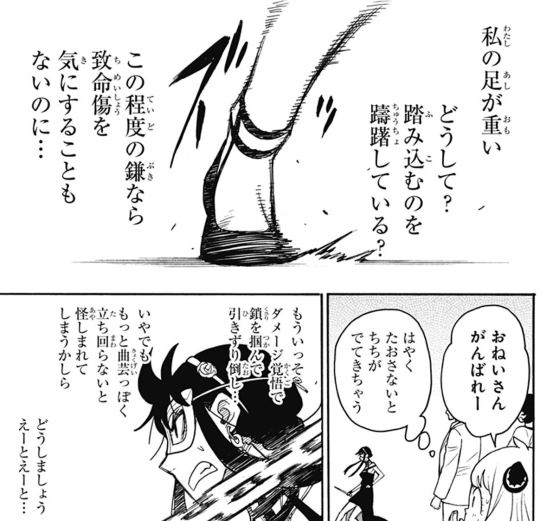
But probably the most notable example of her completely dropping keigo is near the end of her big battle against the assassins on the cruise ship, where she finally comes to realize what she's fighting for. During her whole epiphany scene – starting from when she thinks of Yuri and herself as kids until she stands up and says she won't stop fighting – she switches completely to casual speech.
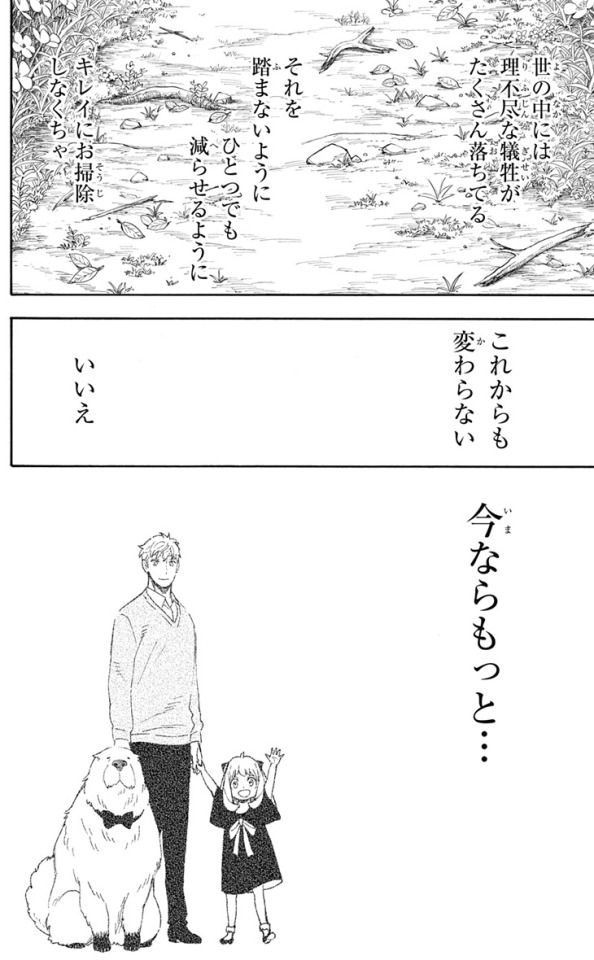
There are many ways to interpret this, but I think it shows what an emotional revelation this was for her: she remembered that the suffering in the world is what caused her to want to protect Yuri from any kind of tragedy, and now the same can be said for Loid, Anya, and Bond. She remembered the words of acceptance she heard from Loid when they first met, words no one else had likely ever said to her before. She realized that she didn't care what happened to her as long as she could stop anything bad from happening to her loved ones – in that moment, no formalities were necessary with such intense self-reflection.
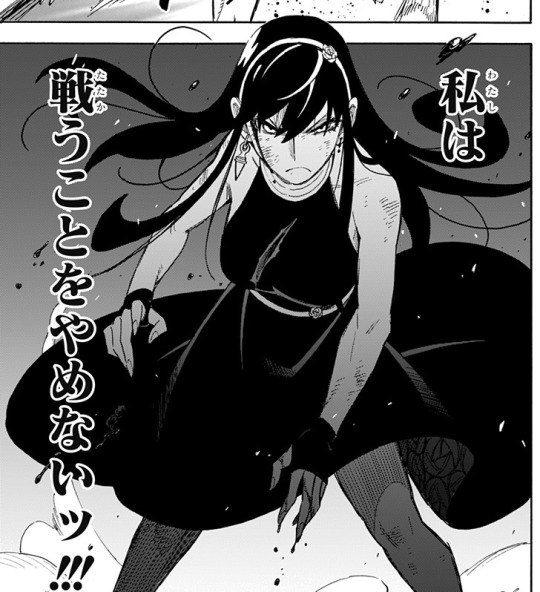
Continue to Part 4 ->
<- Return to Part 2
#sxf#spy x family#spy family#spyxfamily#loid forger#yor forger#anya forger#twiyor#sxf manga#sxf analysis#sxf manga spoilers#sxf meta
463 notes
·
View notes